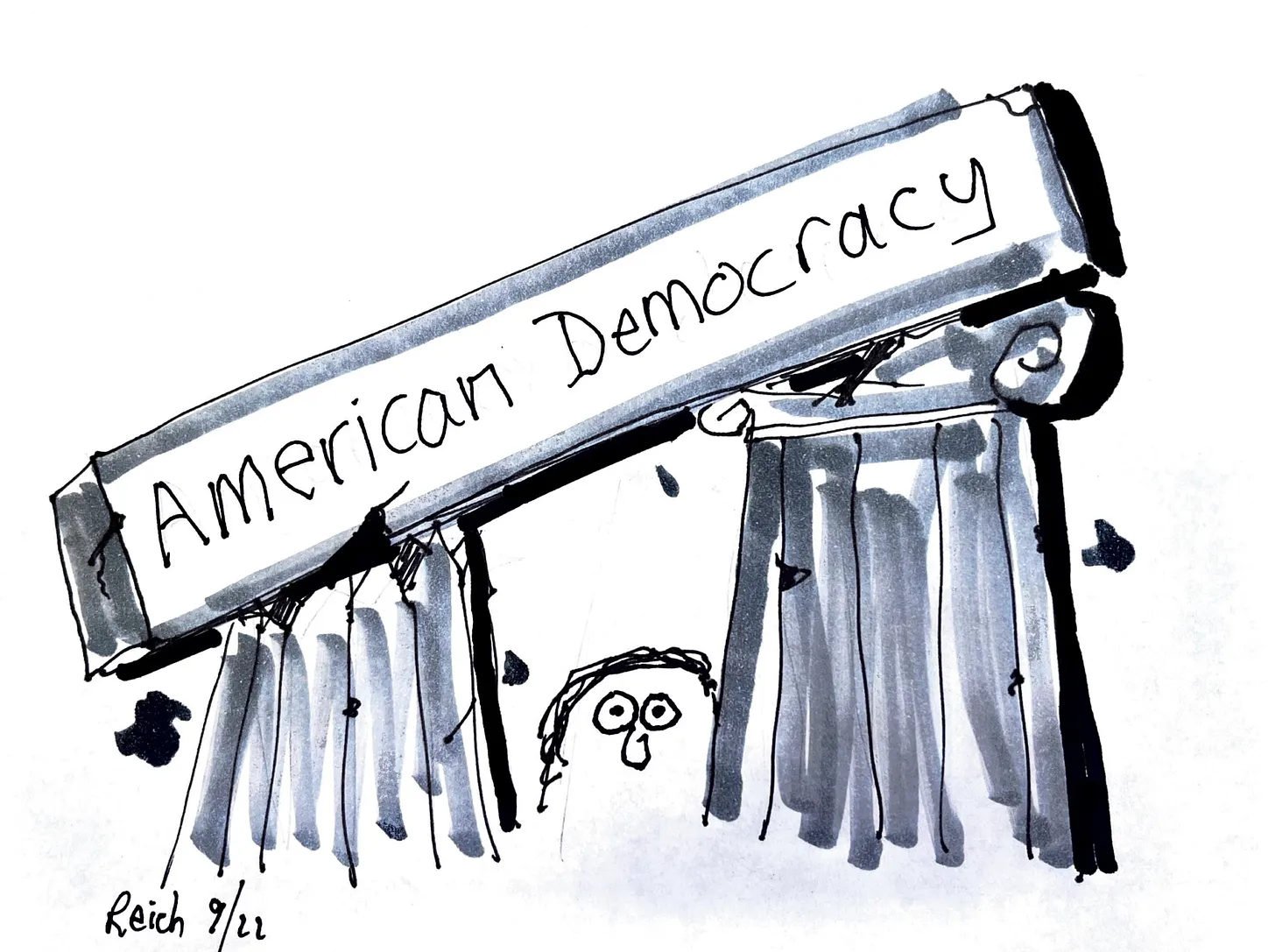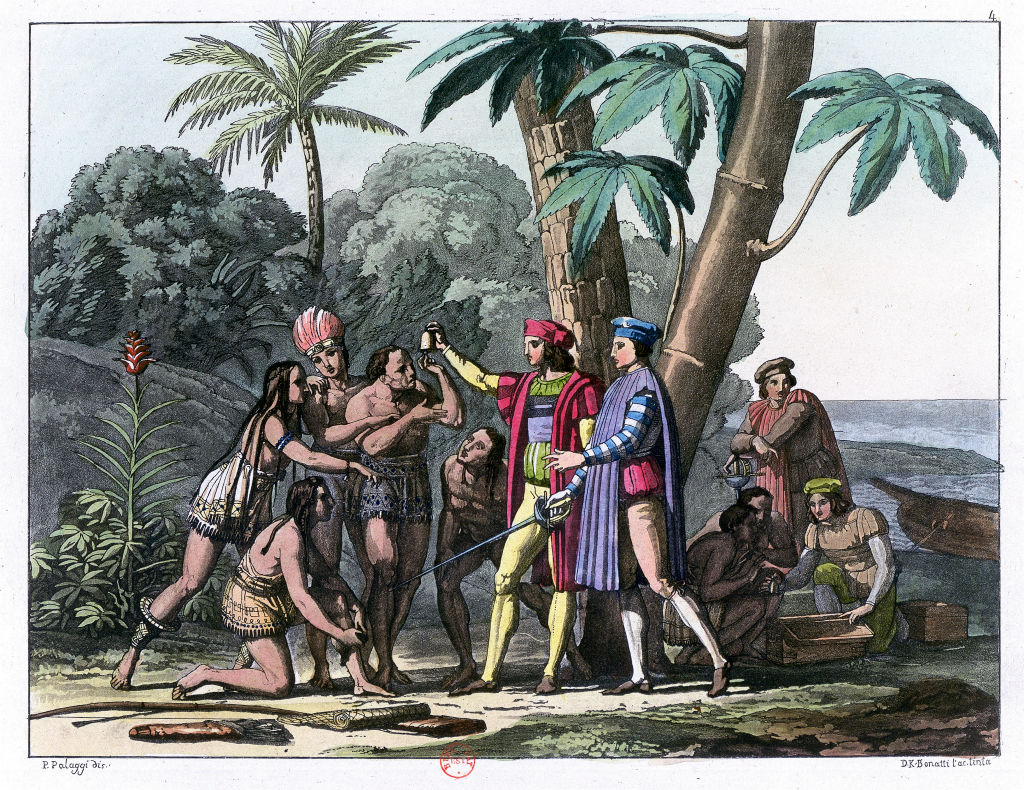- Further thoughts on how science fiction informs current social ills;
- Republican doublethink about “No Kings” rallies;
- Columbus Day, and Trump’s veneration of Columbus vs the realities of history;
- Heather Cox Richardson’s perspective on Columbus, and the origin of Columbus Day.
And now to close the loop, at least tentatively for now.
Three days ago I offered three categories which describe most of the posts here on political or religious matters. These are mostly observations, but they are derived from principles of evolutionary psychology and the observation that human nature evolved in a very different environment than the one we live in today. The three: people believe things that are objectively not true; much of human behavior illustrates tribal behavior, not enlightenment behavior; and people tend to sort everything into binaries, preferring simplicity to complexity.
Two days ago I mapped these more explicitly to how MAGA illustrates tribal, hypocritical, simple-minded human nature, while what they call “woke” is actually the recognition of other kinds of people outside of one’s tribe, and the recognition that the world is not made of simplistic binaries.
And yesterday I quoted three paragraphs from my upcoming essay listing issues of base human nature, including the limitations of our sensory perceptions, and how these can undermine, even cripple, science fiction that sacrifices careful plausibility for the sake of audience appeal, especially in film and TV. These three were matters of scale, of causation, and of change. Humans tend to woefully overestimate or underestimate these matters, based on intuitions derived from the limited environment of our ancestral past.
So where is this going? My mission isn’t to decry human nature, or science fiction by its worst examples. It’s to identify how science fiction (among other things) can offer a way out of the trap of base human nature, which might well hobble the species into extinction.
Without drawing lines between these various items, I would say that the solutions science fiction offers are suggested at the ends of those three paragraphs from my essay in yesterday’s post (as well as various examples discussed in the rest of that essay). When science fiction recognizes those limitations and consciously thinks around them, and speculates in ways far past “common sense,” that’s when it provides a function no other form of literature can. It provides a perspective into reality, the reality that exists beyond our local matters of family, politics, or religion. If humanity is to survive as a species long-term, it will need to understand that reality.
Science Fiction is a prism in the dawn.
\\\
Most of current American politics is about tribalism, and black and white thinking.
Remember Orwell’s Nineteen Eighty-Four? Doublethink. War is Peace, Freedom is Slavery, Ignorance is Strength. They were slogans that, by repetition, the government convinced people that what they thought was false. 2+2=5.

Robert Reich, 13 Oct 2025: They’re calling it a “Hate America” Rally, subtitled “Rubbish. We’re rallying on Saturday because we LOVE America”
This is about upcoming protests against Trump called “No Kings” rallies that are being described by the right, or at least by Mike Johnson, as “hate-America” events. Implying that if you don’t hate America, you’re OK with Trump acting like a king?
\
Today is Columbus Day. A national holiday in the US. No mail delivery. A quip on Facebook asked, so how do you observe Columbus Day? Get lost in a supermarket looking for spices? (Columbus, to his death, thought he had reached India; posts on FB today noted that Columbus never actually landed anywhere that is now part of the United States.) As always, stories are more important than facts.

Salon, CK Smith, 13 Oct 2025: Trump saves Columbus Day from “left-wing arsonists”, subtitled “Indigenous groups decry the omission of their holiday as Trump calls Columbus ‘the original American hero'”
President Donald Trump reignited a familiar cultural battle by reinstating Columbus Day as a stand-alone holiday and omitting any mention of Indigenous Peoples’ Day from his 2025 proclamation.
Calling Christopher Columbus “the original American hero,” Trump declared his intention to “reclaim [Columbus’s] extraordinary legacy from left-wing arsonists who have sought to destroy his name and dishonor his memory.” The proclamation celebrates Italian-American heritage and portrays Columbus as a symbol of discovery and patriotism. “We’re back, Italians,” Trump said, according to People magazine.
The decision marks a sharp reversal from recent years, when multiple presidents had formally recognized both holidays. Dozens of U.S. cities and states — including Los Angeles, Seattle, and Philadelphia — now observe Indigenous Peoples’ Day to honor Native resilience and acknowledge the violence of colonization.
How this fits? Because the tribe currently in power wants to erase all mentions of other tribes. Our tribe has been right all along; history has always been about Christian Europeans taking over the globe. We have always been at war with Eastasia.
\
Heather Cox Richardson takes an historian’s view.
Letters from an American, 12 Oct 2025: October 12, 2025
Beginning:
On October 9, President Donald J. Trump’s office issued an official proclamation declaring Monday, October 13, “Columbus Day.” The proclamation says that the day is one on which “our Nation honors the legendary Christopher Columbus—the original American hero, a giant of Western civilization, and one of the most gallant and visionary men to ever walk the face of the earth. This Columbus Day, we honor his life with reverence and gratitude, and we pledge to reclaim his extraordinary legacy of faith, courage, perseverance, and virtue from the left-wing arsonists who have sought to destroy his name and dishonor his memory.”
The proclamation goes on to present a white Christian nationalist version of American history, with much more emphasis on Christianity than Trump’s previous, similar proclamations. It claims that Columbus was guided by a “noble mission: to discover a new trade route to Asia, bring glory to Spain, and spread the Gospel of Jesus Christ to distant lands.” “Upon his arrival,” it says, “he planted a majestic cross in a mighty act of devotion, dedicating the land to God and setting in motion America’s proud birthright of faith.”
Nonsense, according to most historians, but it’s important for modern-day Christians to believe this. Later in her post:
This proclamation completely misunderstands the fifteenth-century world of expanding European maritime routes that entirely reworked world trade—including trade in human beings—and the role of Italian mariner Christopher Columbus, who worked for Spain’s monarchs Ferdinand and Isabella, in that expansion.
It also misses what historians call the “Columbian Exchange”: the transfer of plants and animals between the Americas and the “Old World”—Europe, Asia, and Africa—after Columbus’s first landfall in the Bahamas in 1492. That exchange went both ways and transformed the globe, but its effect on the Americas was devastating. When Columbus and his sailors “discovered” the “New World,” they brought with them both ideologies and germs that would decimate the peoples living there.
Estimates of the number of Native people living in North America and South America in 1490 vary widely, but there were at least as many as 50 million, and possibly as many as 100 million. In the next 200 years, displacement, enslavement, war, and especially disease would kill about 90% of those native peoples. Most historians see the destruction of America’s Indigenous peoples as the brutal triumph of European white men over those they perceived to be inferior.
And also this, which is about not accepting easy answers.
Historians are not denigrating historical actors or the nation when they uncover sordid parts of our past. Historians study how and why societies change. As we dig into the past, we see patterns that never entirely foreshadow the present but that give us ideas about how people in the past have dealt with circumstances that look similar to circumstances today. If we are going to get an accurate picture of how a society works, historians must examine it honestly, seeing the bad as well as the good. With luck, seeing those patterns will help us make better decisions about our own lives, our communities, and our nation in the present.
And then some background about how Columbus Day came to be. Racial animosity in the 1920s, “when a resurgent Ku Klux Klan tried to create a lily-white country by attacking not just Black Americans, but also immigrants, Jews, and Catholics.”






